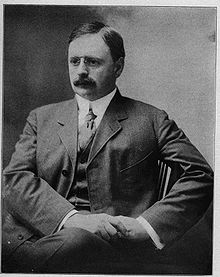Elmer Ernest Southard
| Elmer Ernest Southard | |
|---|---|
 |
|
| Born | July 28, 1876 Boston, Massachusetts |
| Died | February 8, 1920 (aged 43) New York City |
| Nationality | American |
| Fields |
Neuropsychiatry Neuropathology |
| Institutions | Boston Psychopathic Hospital |
| Alma mater | Harvard Medical School |
| Influences | Emil Kraepelin |
| Influenced |
Myrtelle Canavan Karl Menninger Robert Yerkes |
Elmer Ernest Southard (July 28, 1876 – February 8, 1920) was an American neuropsychiatrist, neuropathologist, professor and author. Born in Boston, Massachusetts, Southard lived in the city for nearly his entire life. He attended Boston Latin School and completed his education at Harvard University. At Harvard, Southard distinguished himself as a chess player. After briefly studying in Germany, he returned to the United States as a pathologist at Danvers State Hospital. Southard held academic appointments at Harvard University and its medical school.
He headed the Boston Psychopathic Hospital when it opened in 1912, pioneering the study of brain pathology with particular interests in shell shock and schizophrenia. Southard published several books, including Shell Shock and Other Neuropsychiatric Problems with nearly 1,000 case histories. He was president of the American Medico-Psychological Association and the Boston Society of Psychiatry and Neurology, and held advisory positions with the U.S. Chemical Warfare Service and the Eugenics Record Office.
An influential mentor, Southard guided several well-known figures in medicine and psychology. He worked with neuropathologist Myrtelle Canavan early in her career, and used his influence to obtain a promotion for her in Boston. Southard introduced Karl Menninger to psychiatry, and Menninger later helped establish the foundation which bears his family name. Comparative psychologist Robert Yerkes called Southard "my master of psychopathology."
Southard was married to physician and Wellesley College professor Mabel Fletcher Austin, and they had three children. His interest in chess continued throughout his life, and he enjoyed intellectual gatherings at the home of art collector and friend Walter Arensberg. At the age of 43, Southard died of pneumonia in 1920 during a trip to New York City to deliver lectures to two medical societies.
...
Wikipedia
